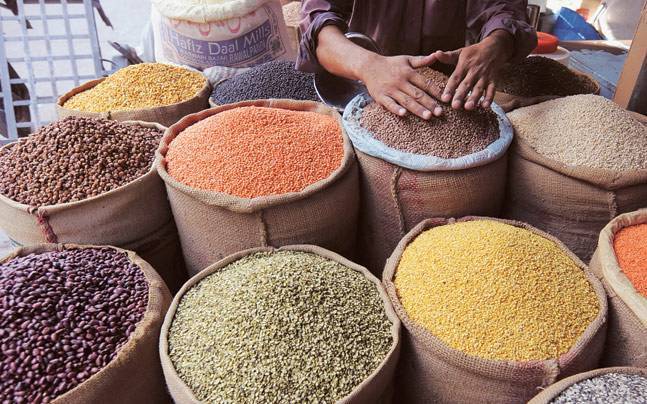New Delhi: Aiming to make India self-reliant in pulses by 2027, Cooperation Minister Amit Shah Thursday launched a tur dal procurement portal through which farmers can register and sell their produce to NAFED and NCCF at a minimum support price or market price.
A similar facility will be unveiled in future for urad and masoor farmers as well as maize farmers, he said.
The minister also transferred via Direct Benefit Transfer (DBT) about Rs 68 lakh to 25 farmers registered with NAFED and NCCF towards payment for sale of tur via the multilingual portal.
The National Agricultural Cooperative Marketing Federation of India Ltd (NAFED) and the National Cooperative Consumers’ Federation of India (NCCF) are two central nodal agencies that undertake pulses procurement on behalf of the government for maintaining a buffer stock. They also buy pulses under the Price Support Scheme when the rates fall below the MSP.
After the launch, Shah said before the sowing operation, tur farmers can register on the portal to sell their produce to NAFED and NCCF at minimum support price (MSP).
The registered tur farmers will have an option to sell either to NAFED/NCCF or in the open market. Suppose the open market price of tur remains higher than the MSP at the time of harvesting, in that case an average rate will be arrived through a formula, he said, adding that the payment will be done through DBT.
Shah further said more farmers were not taking up pulses farming in the country because prices were not assured.
With procurement via the portal, the initiative will bring a major reform in the agriculture sector and help achieve self-reliance in pulses production, he said.
“Tur will be procured from farmers and it is Prime Minister Narendra Modi’s guarantee,” he added.
It may be noted that the tur dal procurement portal comes at a time when the domestic tur output in the 2023-24 kharif season is anticipated to be lower for the second straight year in view of fall in acreage and the central nodal agencies hope to procure maximum quantity for maintaining sufficient buffer and keep a lid on retail inflation ahead of general elections.
Tur production had touched a record of 4.87 million tonnes in 2016-17 kharif season and in the consecutive years the output fell and reached as low as 3.31 million tonnes in 2022-23. As per the initial estimate of the agriculture ministry, tur output is pegged at 3.42 million tonnes for 2023-24 kharif season.
Currently, harvesting of tur — a main kharif pulse crop — is still underway in some parts of the country.
Going forward, Shah said a procurement portal will be launched for the benefit of urad and masoor farmers also. Urad and masoor are two other pulses the country depends on imports and assured procurement will help boost the production.
Since the government is pushing for ethanol blending with petrol and reducing crude oil imports, the minister said maize is being promoted for ethanol making and a portal will be launched wherein farmers can sell their produce.
Stating that the country is still dependent on import of some varieties of pulses except for chana and moong, the Minister stressed on the need to grow more pulses as majority of the population in India are vegetarians for whom pulses are a major source of protein.
That apart, the pulses crops which can be grown with less water have the ability to provide 30-40 kg of nitrogen in one hectare of land and saves farmers from spraying the same, he said.
“Grow pulses, don’t worry about prices. We will procure at MSP,” the minister assured the farming community.
“By December 2027, the country should become self-reliant in pulses. We will not import even one kilo of pulses from January 2028,” he added.
He appealed to Primary Agriculture Credit Societies (PACS), Farmer Producers Organisations (FPOs) and progressive farmers to create awareness about the portal and encourage farmers to take advantage of this facility.
Pulses production has increased in the last ten years to 26.05 million tonnes in 2022-23 from 19.2 million tonnes in 2013-14 crop year (July-June), due to more than two times increase in the minimum support price, he said.
However, the domestic production of pulses is still short of consumption and depends on imports.
Agriculture Minister Arjun Munda, Minister of State for Cooperation B L Verma, and Minister of State for Consumer Affairs Ashwini Choubey as well as NAFED and NCCF officials were also present at the event.
PTI
